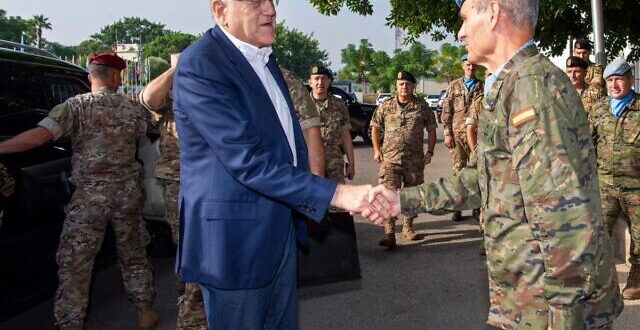In surprise trip to south of country, Najib Mikati meets UNIFIL chief, claims he seeks ‘to reaffirm peace-loving Lebanon’s respect for all legitimate international resolutions’
Lebanese Prime Minister Najib Mikati reaffirmed on Tuesday Beirut’s commitment to a UN resolution that ended a 2006 conflict between Israel and Hezbollah, as cross-border fire along the Lebanon-Israel border continued to intensify.
Hezbollah has been violating that resolution incessantly since the start of the Israel-Hamas war.
Mikati paid a surprise trip to southern Lebanon on Tuesday, as Israel and the terror group — a key Hamas ally — continued to trade deadly cross-border fire, while Israel and its Western allies have repeatedly warned the group against an escalation.
Since October 7 — when Hamas terrorists stormed into Israel from Gaza, brutally murdering at least 1,400 people, mostly civilians, in a deadly rampage and taking more than 200 others hostage — Hezbollah has been operating freely against Israel along Lebanon’s border with Israel, firing rockets and anti-tank missiles at Israeli towns and army positions and opening fire at troops on a near-daily basis. The IDF has responded by striking the terror group’s cells and posts in southern Lebanon.
During his visit, the caretaker prime minister emphasized what he said was Lebanon’s commitment to UN Security Council Resolution 1701, which ended the 2006 Second Lebanon War. That resolution called for the demilitarization in southern Lebanon of all groups other than state security forces. Israel has said for years that Hezbollah, which acts with impunity throughout Lebanon, utterly defies the resolution.
“We came to the beloved south… to reaffirm peace-loving Lebanon’s respect for all legitimate international resolutions and its commitment to implementing” resolution 1701, Mikati said, according to a statement.
Mikati and Lebanon’s army commander Joseph Aoun visited troops and the headquarters of the United Nations Interim Force in Lebanon (UNIFIL) peacekeeping mission during the trip, the statement from the premier’s media office said.
UNIFIL has been largely absent as Hezbollah has intensified its border attacks.
On Tuesday, the IDF said anti-tank guided missiles were fired from Lebanon at the Shtula and the Manara areas on the border. No injuries were caused in the attacks. The military said it carried out a drone strike against a terrorist in southern Lebanon attempting to launch rockets at Israel, and later struck two more cells in southern Lebanon that were launching mortars and anti-tank guided missiles at army posts and nearby towns on the border.
Iran-backed Hezbollah said Tuesday that its operatives had targeted Israeli positions, including with guided missiles and artillery shells. The group said six of its members were killed on Tuesday, bringing the reported number of dead on the Lebanese side since violence erupted earlier this month to 47, most of them Hezbollah operatives but also including four civilians, one of them a Reuters journalist.
At least six Israeli soldiers, 35 Hezbollah gunmen and six Palestinian gunmen have been killed in the exchanges. One Israeli civilian was killed in a Hezbollah attack, and several Lebanese civilians and a journalist were also reported killed by Israeli shelling.
Israel, the US, France and other Western nations have repeatedly warned Hezbollah against entering the ongoing war in a significant manner, with the Pentagon saying it would not hesitate to act if the situation along the border escalates.
Visiting Israel on Tuesday, French President Emmanuel Macron — whose nation has strong ties with Lebanon — named Hezbollah, Iran and the Houthis in Yemen when he said they should “not take the ill-considered risk of opening new fronts.”
 Eurasia Press & News
Eurasia Press & News




